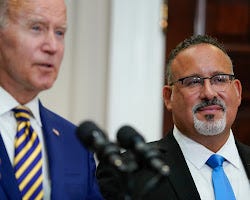
Abstract:
Student loan forgiveness is a policy proposal that aims to alleviate the burden of student debt and provide relief to borrowers. The issue of student loan debt has become a major policy concern in the United States, with many individuals struggling to pay off their loans and facing financial hardship as a result. This paper aims to explore the concept of student loan forgiveness, its potential benefits and drawbacks, and the various proposals that have been put forward to address the issue.
Introduction:
Student loan debt has become a major issue in the United States, with millions of individuals struggling to pay off their loans and facing financial hardship as a result. In response to this issue, many policymakers and advocates have proposed student loan forgiveness as a solution.
Student loan forgiveness is a policy proposal that would provide relief to borrowers by canceling some or all of their student debt. The idea behind student loan forgiveness is to alleviate the burden of debt and help individuals who are struggling to make ends meet.
There are many potential benefits to student loan forgiveness, including increased economic mobility, reduced financial stress, and improved mental health outcomes. However, there are also potential drawbacks, including increased costs to taxpayers and concerns about moral hazard.
There are several proposals for student loan forgiveness that have been put forward by policymakers and advocates. These include targeted forgiveness for certain groups of borrowers, such as low-income individuals, and blanket forgiveness for all borrowers.
This paper aims to explore the concept of student loan forgiveness, its potential benefits and drawbacks, and the various proposals that have been put forward to address the issue. By understanding the complexities of this issue, we can better evaluate the potential impact of student loan forgiveness and work towards a more equitable solution to the problem of student debt.
The U.S. Department of Education (ED) has announced a new rule that will simplify the process for borrowers to qualify for student loan forgiveness under the Public Service Loan Forgiveness (PSLF) program. The new rule, which goes into effect on July 1, 2023, will make it easier for borrowers to track their progress and ensure that they are making qualifying payments.
Under the previous PSLF rules, borrowers had to make 120 qualifying payments over a period of 10 years in order to have their loans forgiven. However, the new rule eliminates the 10-year time limit and allows borrowers to count all of their payments, regardless of when they were made, as long as they are working full-time for a qualifying employer.
The new rule also expands the definition of qualifying employers to include all public service organizations, including nonprofits, government agencies, and tribal colleges and universities. This means that more borrowers will now be eligible for PSLF.
To be eligible for PSLF, borrowers must also have Direct Loans, which are federal student loans that are made or guaranteed by the U.S. Department of Education. Borrowers can check to see if their loans are Direct Loans by logging into their student loan account on the ED website.
If you think you may be eligible for PSLF, you can use the ED’s PSLF Help Tool to see how many qualifying payments you have made and to estimate when your loans may be forgiven. You can also use the tool to track your progress and make sure that you are making qualifying payments.
The new PSLF rule is a major step forward for borrowers who are struggling to repay their student loans. By simplifying the process and expanding eligibility, the new rule will make it easier for more borrowers to achieve the dream of student loan forgiveness.
As student loan debt continues to be a significant issue for many Americans, it is particularly challenging for senior citizens who are still paying off their student loans. For seniors on fixed incomes, student loan payments can be a significant burden, and it can be challenging to make ends meet while also paying off their loans. Fortunately, there are several remedies available for seniors who are struggling with student loan debt.
One option for seniors is to explore income-driven repayment plans. These plans are designed to make student loan payments more manageable by basing payments on income rather than the total amount owed. This can be particularly helpful for seniors who are on fixed incomes and have limited resources.
Another option is to explore loan forgiveness programs specifically designed for seniors. For example, the Department of Education offers a loan forgiveness program for individuals who work in public service jobs for a certain number of years. Additionally, some states offer loan forgiveness programs for seniors who work in certain professions, such as teaching or nursing.
Seniors may also be able to consolidate their student loans into a single loan with a lower interest rate. This can help reduce their monthly payments and make it easier to manage their debt.
Finally, seniors may want to consider seeking the assistance of a financial advisor or credit counselor. These professionals can help seniors navigate the complex world of student loan debt and identify the best strategies for managing their debt.
In conclusion, there are several remedies available for seniors who are struggling with student loan debt. By exploring income-driven repayment plans, loan forgiveness programs, consolidation options, and seeking the assistance of financial professionals, seniors can take steps to manage their debt and achieve financial stability in their later years.
No comments:
Post a Comment
Welcome to Leave a Comment